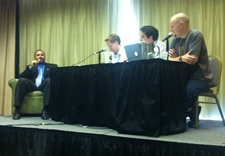Abusing Your Community: “Friends” and How You Use Them
I have grown to become very careful about my usage of the word “friend,” when I am talking about other people. A lot of people have really diluted this term to the point where, for some, it means “person that I once had a pleasant conversation with” or “someone I paid to do something for me” or “person who helped me that time.”
Though I do slip up once in a while, when I call someone my friend, believe me when I say that. There are differing levels of friendship and I have friends who I am closer to than others and who I trust with more than others, but if I call someone my friend, I’ve established some form of a meaningful relationship with them, in public and/or in private.
If I was to define my personal community, I would say that it is the people who appreciate and support what I do. But, of those people, only a fraction are friends. Some are acquaintances, some I have only rare spoke to, if at all.
Sometimes, people abuse their community and one way that I am seeing this happen is when people act far too familiar with individuals within it, and then they place burdens on those people, because of that constructed relationship, based on little, that the recipient may not even be comfortable with.
Friends are not people who will place undue burden on you, who will expect you to do things for them or, more specifically, their business, just because they are your friends, regardless of what else they may be dealing with. Friends are not people who are not there for you, when you have been there for them. Friends don’t put you in awkward positions or set you up for embarrassment. Friends don’t put people above you, on their list of priorities, simply because those people can help them make more money for themselves. That’s not friendship.
I had this happen with an event that I spoke at. The organizers said I was their friend and, for a while, I bought that. But, I realized a trend. Mistake after mistake, problem after problem, dropped ball after dropped ball, they used the same excuse to explain their problems. They’re working hard and, after all, we’re friends. We’re friends. Friends. Over and over again.
Eventually, I realized that it was a point of manipulation, to make me feel bad or guilty for pointing out when something was not correct or was handled in a poor fashion. It was a cheap way to silence me. It was a way to get me to feel like I should do them favors and not be adequately compensated. It was a way to try to get me to accept less than standard treatment and to be treated with less respect than other speakers at the event who had contributed much less.
If you had asked me if we were friends, I may have told you so at the start. But, that quickly faded and I realized that we were not friends. We were acquaintances because, honestly, outside of doing things for them, we didn’t have a relationship and I didn’t know them all that well. Eventually, I recognized them, not as friends, but as bloodsuckers.
When I finally called them on it, when I finally laid out some, not all of the issues, they said it was me – it was my fault. I was a bad, unreasonable friend.
The problem? We were never friends to begin with. I was just a member of their community. A member that they abused and I’ve made sure they won’t have the opportunity again.

